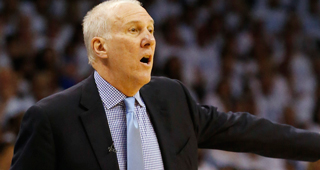“It has always seemed strange to me…the things we admire in men, kindness and generosity, openness, honesty, understanding and feeling, are the concomitants of failure in our system. And those traits we detest, sharpness, greed, acquisitiveness, meanness, egotism, and self-interest, are the traits of success. And while men admire the quality of the first they love the produce of the second.”
-John Steinbeck
In a league where dollar signs and fame drive athletes’ ego and greed, it is quite rare to see a team like the San Antonio Spurs continue to show the model of consistency it takes to compete at such a high level for the greater part of two decades.
Fused with the team’s precision and constant ball movement, the Spurs were instrumental in dethroning the previous two-time world champion Miami Heat in an unexpectedly quick series. As predicted previously here, San Antonio refused to allow the collapse of last year’s Finals bury them, and instead used that as motivation to construct a vindictive demeanor that eventually lead to a title.
“We’ll do it this time. We’re happy it’s the Heat again.” Tim Duncan said immediately after the Spurs advanced to the Finals. “We’ve got that bad taste in our mouth still.”
Gregg Popovich describes his teams’ model of consistency as ‘pounding the rock.’ The Spurs started as one of the most refined halfcourt basketball systems in the early 2000s, and have gradually evolved to an up-tempo style, ever since Mike D’Antoni’s seven seconds or less offense took the league by storm.
During the Finals, the seamless execution of the Spurs was been a thing of beauty. According to NBA.com, the Spurs ranked first in touches per game at 430.5 (rankings include only teams with 10 plus playoff games).
During the fourth quarter of Game 2 in the Finals, the Spurs became stagnant and lost their sole game to LeBron James and the Heat. After the game, Popovich called his team out for not moving the ball and the Spurs responded. In both road games in Miami, the Spurs averaged 372 passes per contest on 4.38 passes per possession. Almost every scored Spurs’ basket was assisted from an assist; in other words, the hockey assist, the assist that never gets credited with the stat. Had hockey assists been tracked, both Boris Diaw and Tony Parker would sure be recognized with double digit assists in every game during the Finals.
The Spurs finished the Finals series with 1,771 total passes and a 44.7 field goal percentage on uncontested shots. That field goal percentage jumped to 66.5% when they were assisted.
Additionally, the Spurs finished with a 119.0 offensive rating, the highest Finals offensive rating recorded since the three-point shot was applied in 1979. They also set multiple records in the Finals of shooting at a clip of 52.8 percent, converting 55.
While watching these Finals, I was reminiscing of the 2004 Finals, when the Detroit Pistons took out the Lakers in five games. Talent-wise alone, the Lakers were clearly the better team, but the Pistons' execution as a team vividly bought out many similarities to the Spurs. Kawhi Leonard was the first Finals MVP to win the award before becoming an all-star since Chauncey Billups. The Spurs finished with a net rating (offensive rating minus defensive rating) of 16 points, while the then Pistons finished with a similar net rating of 13 points. The games where the Pistons and Spurs won were all seemingly blowouts, even in some cases when the final scores were closer than they showed.
Over the past 15 years, Popovich successfully implemented a system—where no single individual was bigger than his teammates—no matter how talented he was. From future first ballot Hall of Famer Tim Duncan taking drastic pay cuts through the years to the endless carousel of backup big men, Popovich effectively created a scheme that refutes the Steinbeck claims that generosity and sharing are failures in today’s society.


